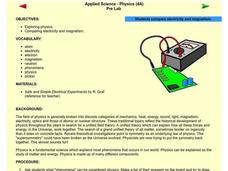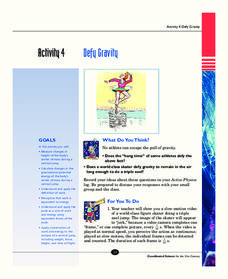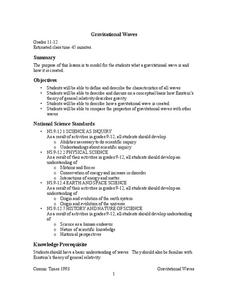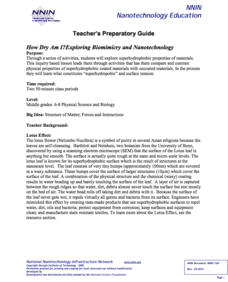Teach Engineering
Thrown for a Loop
Round and round it goes. Class members observe a current carrying loop in a magnetic field and calculate its associated torque. They then apply what they have learned to example problems to solve for the torque and to calculate the...
Teach Engineering
The Advantage of Machines
Show your students how to make their work easier. The first lesson plan in a series of 10 introduces the class to work and the way simple machines can be make work easier. The simple machines scholars can find in everyday items are...
NASA
Dark Matter NASA Conference
Young scholars calculate the escape velocity of planets in our solar system and use that knowledge to calculate the escape velocity for NGC 2300 group. They then suggest reasons for the escape velocity to be higher than possible given...
Curated OER
Electricity and Magnetism
Fourth graders compare electricity and magnetism. In this science lesson, 4th graders discuss the concepts of electricity and magnetism and brainstorm examples of electrical and magnetic forces.
Curated OER
Types of Forces
Students study scientific names and descriptions of forces. In this motion lesson students organize information into a graphic organizer then teach it to other students.
Curated OER
Identifying Forces
Students identify, describe and indicate direction and relative magnitude of forces. In this motion lesson students work in groups to identify the force that is described to them.
Curated OER
Spin, Spin, Spin That Body!: Figure Skating, Physics, Science, Winter Sports, Olympics
Students learn the scientific principles of centripetal force through research and experimentation.
It's About Time
Automatic Triggering Devices
How does the air bag trigger in an accident? The lesson explores how automatic triggering devices work in automobiles. Using examples such as a seat belt lock and air bag, scholars design their own device to better understand the...
It's About Time
Defy Gravity
Test the limits of gravity while encouraging full class participation with this thrilling lesson. Pupils investigate the meaning of work and how it is equivalent to energy. They explore the joule and apply it as a unit of work. They...
California Polytechnic State University
Australian Geography Unit
At the heart of this resource is a beautifully detailed PowerPoint presentation (provided in PDF form) on the overall physical geography of Australia, basic facts about the country, Aboriginal history, and Australia culture and lifestyle.
Bowels Physics
Electrostatics
Explore behavior of particles that cannot be seen with a detailed PowerPoint presentation that outlines the basics of electrostatics. The presentation addresses the charge of subatomic particles, conductors and insulators,...
Curated OER
Roller Coasters
Twisting and turning through the sky, roller coasters are popular attractions at amusement parks around the world, but how exactly do they work? Explore the physics behind these thrilling rides with an engineering design activity....
DiscoverE
Slinky® Science
Toys are great for learning about physics. Scholars use Slinky® toys to study Newton's laws of motion and types of energy. After a little play, they then model longitudinal and transverse waves with the Slinky® toys.
NASA
Gravitational Waves
Young scientists participate in a hands-on experiment to explore Einstein's theory of relativity in a creative manner. They investigate various waves and compare their characteristics as they discuss how each wave is created....
Teach Engineering
Off-Road Wheelchair Challenge
Challenge your class to use their understanding of the engineering design process to design and build a small-scale, off-road prototype for an assistive technology device. Teams select materials to build their scale models, and, using...
National Nanotechnology Infrastructure Network
How Dry am I? Exploring Biomimicry and Nanotechnology
Help your classes feel like they can walk on water! An engaging inquiry-based lesson has young scholars experiment with different surface coatings. They make observations about their properties and how they relate to the surface tension...
Utah Education Network (UEN)
Utah Open Textbook: 7th Grade Science
Physical and biological factors affect everyday living. Scholars explore electromagnetic forces, motion, the rock cycle, and geological changes. They examine cells as the building blocks of life and how organisms reproduce using images...
New Mexico State University
Lab 6: Kepler's Laws
A 15-page package thoroughly teaches your physics or astronomy learners about Kepler's three laws of planetary motion. Each one is stated and explained. Class members answer questions, solve problems, and participate in the classic...
It's About Time
Life (and Death) Before Seat Belts
Did you know only 80-90% of passengers wear a seat belt in a moving car? Young scholars use clay and a cart to complete an experiment about what happens without a seat belt in a collision. The lesson includes Newton's Second Law of...
SeaWorld
Design a Fish
Craft some neat refrigerator magnets while studying ocean animals with a lesson about the anatomy of a fish. After kids learn about the different parts and shapes of fish, they use modeling compound to design their own fish.
CK-12 Foundation
Newton's Cannon
Gravity does more than keep our feet on the ground — it holds a satellite in orbit, too. Help learners understand the effects of gravity on an orbiting object through a simulation activity. Individuals adjust a launch speed and watch as...
Institute of Electrical and Electronics Engineers
Fun with Speedboats!
After reading about marine engineers and naval architects, it's all hands on deck to design and test a speed boat. This lesson is designed for the Next Generation Science Standards in engineering and can be a centerpiece for a STEM...
Institute of Electrical and Electronics Engineers
Blast Off!
With the use of a model rocket kit, aspiring aerospace engineers work cooperatively to construct and launch a rocket. A preparatory reading assignment is included, covering Newton's laws of motion and information about the first...
NOAA
Tides
Low tides, high tides, spring tides, neap tides, diurnal tides, semidiurnal tides, mixed tides ... just how many types of tides are there? The 10th installment of a 23-part NOAA Enrichment in Marine sciences and Oceanography (NEMO)...
























